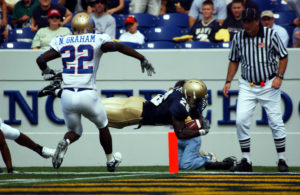When the United States Supreme Court denies certiorari (cert.) to a case ruling that a large nonprofit organization is subject to federal antitrust laws, most in the sports world don’t pay close attention. On October 3rd, 2016, however, the U.S. Supreme Court grabbed the attention of the sports world by denying cert. in O’bannon v. NCAA: a case that held that the National Collegiate Athletic Association’s (NCAA) rules and bylaws operate as an unreasonable restraint of trade, in violation of antitrust law. Effectively, the Courts denial of cert. substantiated the 9th Circuits ruling that the NCAA could not prevent its member colleges from offering their athletes a completely free education.
According to Marc Edelman, Associate Professor of Law at the Zicklin School of Business and contributing writer for Forbes, “[r]ecognizing that the NCAA must comply with federal antitrust laws…opens the gateway, at least within the 9th Circuit, for a wide range of more meaningful challenges to particular NCAA “labor” practices.”
A case that may prove Professor Edelman’s point is currently on the 9th Circuit’s docket: Jenkins v. NCAA. Jenkins, a class action lawsuit, seeks to overturn the NCAA rules that place a cap on college athlete compensation. If successful, Jenkins could create a situation where college athletic programs must bid for student athletic services. Although not all federal circuits have ruled that the NCAA is subject to federal antitrust laws, with the Supreme Court’s denial of cert. in O’bannon, a circuit split does create a situation where college athletes may enjoy expanded opportunities to challenge NCAA rules.
Nick Aquart is a Sports Highlight Contributor for the Harvard Journal of Sports and Entertainment Law and a current first year student at Harvard Law School (Class of 2019).

